常见情态动词讲解
情态动词讲解

情态动词讲解情态动词1.表示能力时,只能用can (现在) could do (过去能做)was/were able to do:(1)过去能做( 2 ) 过去设法成功完成某一具体动作 =manage to do=succeed in doingEg. 1.A blind man can not judge colors.2.He could/was able to swim like a fish when he was young.3.Though he was tired , he was able to swim across the river.4.Because he was tired, he couldn’t /wasn’t able to swim across the river.(在否定结构中无区别)2.表推测时:may/might( 语气最不肯定,多用于肯,否定句) 可能can (语气肯定,一般不用于肯定句)可能could (较can不确定,也可用于肯定句) 可能must (语气最肯定,只用肯定句)一定should(表可能性,推论,推测,期待等)按理该;估计ought to (表可能性,揣测,猜测,期望等)照说应该,理应may/might have +ed (语气不肯定) 过去可能……can’t/couldn’t have +ed (语气肯定)过去不可能……must have +ed (语气肯定) 过去一定should have +ed 过去按理应该ought to have +ed 过去按理Eg. 1.A: Look, someone is coming. Who can it be?B: It may be the headmaster.A:It can not be him.He has gone to Shanghai.B: It must be Mr Zhang. He looks like the headmaster.2.I don’t know his age. He could be thirty or thirty-five.3. The report is written after careful investigation, so itshould be reliable.4.---I didn’t see Mary at the meeting yesterday.---She might have been ill, I guess.5.The street are all dry. It couldn’t have rained during the night.3. 表责备时:may/might have +ed(语气委婉)过去本可能…can/could have +ed (语气委婉) 过去本能……should have +ed (语气强烈) 过去本应该……,而未……ought to have +ed (语气强烈) 过去本应该……,而未……needn’t have +ed 过去本不必…,却做了…Eg. 1.He might have given you more help, even though he was very busy.2.---Did you listen to the speech?----No, we could have attended it.But we had a lot of traffic on our way.3.The plant is dead. Maybe I should have given more water.4.Your brother’s failed in English again. You ought to have given him more help.5. ---Mr Smith didn’t come last night, did he?---- No. We needn’t hav e waited for him. A whole night was wasted. 4.表未曾实现:was/were to have +ed 过去本打算/本想……should like /love to have +ed 过去本想…… 而没……=would like/love to have +ed =should have liked /loved to do=would have liked/loved to dohad better have +ed 当初最好……would rather h ave +ed 当初真该……Eg. 1. He was to have come here yesterday, but he had an important meeting to attend.2. We would like to have gone to see the film, but we had no time.3. I would love to have gone to the cinema to see the film that day, but thetickets were all sold out.4. I should have liked to stay another week, but I had to go back to work.5.We had better have bought (当时真该买) the book.6.She would rather have stayed (当初真该呆) at home than go to see the dullfilm.5. 委婉的请求肯定的答语could canmight maywould willEg. 1. ---Could you lend me your book?---Certainly, I can.2. ---Might I ask you a question?---Surely, you may.3. ---Would you do me a favor?---Of course, I will.4. ---Would you like to do it for me?---Yes, I’d like to. ( 特殊)7. Shall : 可用于一、三人称表示征询对方意见或请求指示Eg. Shall he wait for you at the gate?Shall we begin our lesson?Shall 用于第二、第三人称,表示说话人对对方的命令、警告、允诺或威胁。
常见情态动词讲解
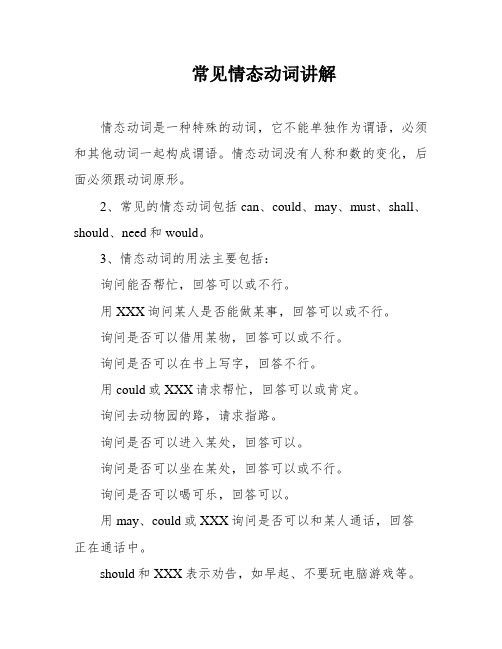
常见情态动词讲解情态动词是一种特殊的动词,它不能单独作为谓语,必须和其他动词一起构成谓语。
情态动词没有人称和数的变化,后面必须跟动词原形。
2、常见的情态动词包括can、could、may、must、shall、should、need和would。
3、情态动词的用法主要包括:询问能否帮忙,回答可以或不行。
用XXX询问某人是否能做某事,回答可以或不行。
询问是否可以借用某物,回答可以或不行。
询问是否可以在书上写字,回答不行。
用could或XXX请求帮忙,回答可以或肯定。
询问去动物园的路,请求指路。
询问是否可以进入某处,回答可以。
询问是否可以坐在某处,回答可以或不行。
询问是否可以喝可乐,回答可以。
用may、could或XXX询问是否可以和某人通话,回答正在通话中。
should和XXX表示劝告,如早起、不要玩电脑游戏等。
用should询问某人是否应该做某事,回答肯定或否定。
表示建议时可以用“你愿意…吗”来引导。
He said it was okay for me to smoke in the room。
Instead of using "may" to answer ns。
it's better to use phrases like "Yes。
please," "Certainly," "Please don't," "You'd better not," or "No。
you mustn't" XXX。
He might be at home。
but I'm not sure。
She may not be aware of this matter。
They could be having a meeting。
but I'm uncertain。
小升初常见情态动词用法归纳

小升初常见情态动词用法归纳情态动词是英语中一个重要的语法概念,它用来表示说话人对某个动作或状态的态度、推测、命令、许可等。
了解和正确运用常见情态动词的用法对于学习英语至关重要。
在小升初考试中,情态动词的应用也是一个重要的考点。
本文将归纳总结小升初常见情态动词的基本用法,帮助同学们更好地掌握和运用。
一、can/could1. 表示能力和技能:- can表示现在或将来的能力,could表示过去的能力。
- can和could在肯定句中用来表达能力、掌握程度、技能等。
例如:I can swim.(我会游泳。
)2. 表示许可与请求:- can表示直接的许可,could表示委婉的许可。
- can和could在疑问句中用来提出请求或询问是否有许可。
例如:Can I go to the washroom?(我可以去洗手间吗?)3. 表示可能性:- can和could用来表示某种可能性。
- can表示一般的可能性,could表示一种更加虚拟的可能性。
例如:It can be true.(可能是真的。
)二、may/might1. 表示推测和猜测:- may和might用来表示对某种情况的推测和猜测。
- may表示一种更有把握的可能性,might表示一种更加不确定的可能性。
例如:He may be late.(他可能会晚到。
)2. 表示许可与请求:- may表示正式的许可,might表示委婉的许可。
- may和might在疑问句中用来提出请求或询问是否有许可。
例如:May I use your pen?(我可以用你的笔吗?)三、must1. 表示推测和肯定:- must用来表示对某种情况的推测和肯定。
- must表示说话人的判断或逻辑上的必然。
- must在疑问句中表示对应对方的情况感到惊异或不解。
例如:You must be tired.(你一定很累。
)2. 表示义务和必须:- must表示说话人的认定,有一种应当的意味。
初中英语情态动词的讲解

初中英语情态动词的讲解情态动词是英语中的一类特殊动词,用于表示说话人的态度、推测、能力、许可等。
初中阶段研究英语时,情态动词是一个重要的语法知识点。
本文将对初中英语中常用的情态动词进行讲解。
1. CanCan 是一个情态动词,用于询问和表示能力、可能性、允许等。
是一个情态动词,用于询问和表示能力、可能性、允许等。
1.1 用法- 用于询问能力:Can 用于询问某人是否有能力做某事。
Can用于询问某人是否有能力做某事。
- Can you swim?(你会游泳吗?)- 用于表示可能性:Can 用于表示某事有可能发生。
Can用于表示某事有可能发生。
- It can rain tomorrow.(明天可能会下雨。
)- 用于征求允许:Can 用于请求允许做某事。
Can用于请求允许做某事。
- Can I borrow your pen?(我可以借用你的钢笔吗?)1.2 注意事项- 当 Can 用于疑问句时,其后的动词需用原形。
Can用于疑问句时,其后的动词需用原形。
- Can she play the guitar?(她会弹吉他吗?)2. MustMust 是一个情态动词,用于表示必须,义务和推测。
是一个情态动词,用于表示必须,义务和推测。
2.1 用法- 用于表示必须:Must 用于表示某事是必须的。
Must用于表示某事是必须的。
- You must finish your homework before watching TV.(你必须在看电视之前完成作业。
)- 用于表示义务:Must 用于表示某事是责任所在。
Must用于表示某事是责任所在。
- We must obey the rules.(我们必须遵守规则。
)- 用于表示推测:Must 用于表示一种较为确信的推测。
Must用于表示一种较为确信的推测。
- He must be tired after running for so long.(他跑了这么长时间,一定很累了。
《情态动词讲解》课件

1
表示能力和可能性
这一用法涉及到情态动词在表示一个
表示推测和推断
2
人或事物的能力或可能性方面的应用。
情态动词还可用来表示具有推测性质
的情况和推断。
3
表示义务和建议
情态动词可用于表示某人应该或必须
表示意愿和打算
4
做的事情,或者提出建议。
用情态动词来表达某人的意愿或打算 进行的行为。
情态动词的否定和疑问
3 同时使用情态动词和实义动词时的注意事项
了解使用情态动词和实义动词时需要注意的细节。
总结
情态动词的重要性
深入理解情态动词的重要性,以及它们在语言中 的作用。
情态动词的学习方法
提供一些有效的学习方法,帮助您更好地掌握情 态动词的用法。
参考资料
书籍推荐
推荐一些深入学习情态动词的相关书籍。
网站推荐
建议一些在线资源,以便进一步学习和练习 情态动词。
2 may/might
表示推测和推断的情态 动词。
3 shall/should
表示义务和建议的情态 动词。
4 will/would
表示意愿和打算的情态动词。
5 must
表示必须和必然的情态动词。
情态动词的用法
情态动词有多种用法,我们将详细讨论其中的一些,包括表示能力和可能性、推测和推断、义务和建 议,以及意愿和打算。
特点
情态动词具有几个典型的特点,例如它们没有人称和数的变化,并且后面跟原形动词。
情态动词的种类
情态动词有几种常见的类型,我们将深入讨论其中的几个种类,包括can/could、may/might、 shall/should、will/would以及must。
1 can/could
情态动词讲解

情态动词讲解情态动词讲解情态动词是英语中常用的动词,它可以表示说话者对所说内容的态度、看法或程度等。
它在句子中多占第一位,后才接动词的原形。
情态动词也叫条件动词,它主要包括can,could,may,might,shall,should,will,would,must等。
一、cancan 可以表示“能够,会”的意思,表示能力,而且是推测性的能力。
另外,can还有“允许,请求”的意思。
常见的句型有:1)Can you come with me? 你能和我一起来吗?2)Can you answer this question? 你能回答这个问题吗?3)He can speak three languages. 他会说三种语言。
二、couldcould 表示能力,表示过去的能力,表示推测性的语气。
常见的句型有:1)Could you help me? 你可以帮助我吗?2)Could you tell me your name? 你可以告诉我你的名字吗? 3)She could speak two languages when she was five. 五岁时,她会说两种语言。
三、maymay 表示允许,许可,也可以表示可能,推测性的可能。
常见的句型有:1) May I come in? 我可以进来吗?2)May I go outside? 我可以出去吗?3)It may rain tonight. 今晚可能会下雨。
四、mightmight 可以表示可能,推测性的可能,它比may更加虚弱。
常见的句型有:1)He might come here tomorrow. 明天他可能会来这里。
2)The weather might change tomorrow. 明天天气可能会变化。
3)Might I help you? 我可以帮助你吗?五、shallshall 可以表示建议,也可以表示未来的时间。
它的用法和will 有一定的相似之处,但是它比will更正式,也比will更加强调客观事实。
英语情态动词讲解

可能性的强弱层次
must >should/ought to >can/could > may/might
should/ought to表示推测
根据经验的推测,“应当、应该” e.g. Your photos should be ready by12:00.
could表过去的能力 At that time we thought the story could not be true.
You cannot smoke in the meeting room. (此句的cannot 表示“禁止”)
情态动词can/could
01
can/could 与be able to 相比
may用于表示,应该(多用于法律条文)
03
e.g. He may be a teacher.
may/might表示可能性
02
e.g. May I use your bike?
may表示请求别人允许
01
情态动词may/might
情态动词shall/should
用于第一、三人称,征求对方意见 e.g. Shall we go now? What should we do next ? (用should 比 shall 表示更客气) shall 用于法律、规定,表示义务和规定 g. The sign reads:No person shall smoke here! should表示应该 e.g. You should not judge a man by his clothes.
Modal Verbs
PLEASE ENTER YOUR TITLE HERE
英语情态动词用法归纳
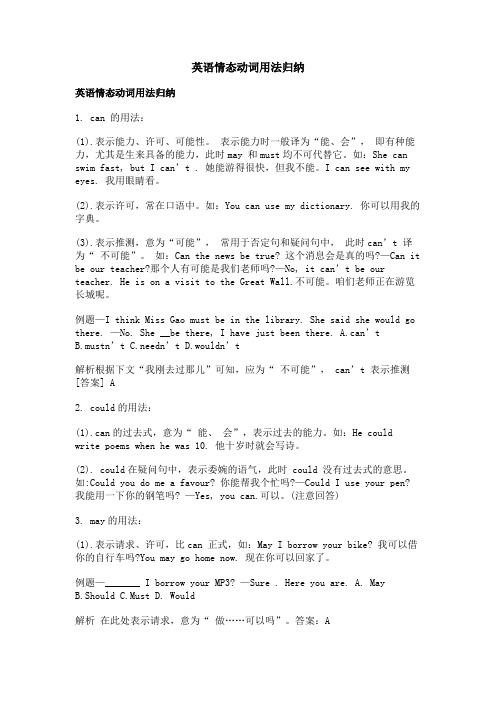
英语情态动词用法归纳英语情态动词用法归纳1. can 的用法:(1).表示能力、许可、可能性。
表示能力时一般译为“能、会”,即有种能力,尤其是生来具备的能力,此时may 和must均不可代替它。
如:She can swim fast, but I can’t . 她能游得很快,但我不能。
I can see with my eyes. 我用眼睛看。
(2).表示许可,常在口语中。
如:You can use my dictionary. 你可以用我的字典。
(3).表示推测,意为“可能”,常用于否定句和疑问句中,此时can’t 译为“ 不可能”。
如:Can the news be true? 这个消息会是真的吗?—Can it be our teacher?那个人有可能是我们老师吗?—No, it can’t be our teacher. He is on a visit to the Great Wall.不可能。
咱们老师正在游览长城呢。
例题—I think Miss Gao must be in the library. She said she would go there. —No. She __be there, I have just been there. A.can’tB.mustn’tC.needn’tD.wouldn’t解析根据下文“我刚去过那儿”可知,应为“ 不可能”,can’t 表示推测[答案] A2. could的用法:(1).can的过去式,意为“ 能、会”,表示过去的能力。
如:He couldwrite poems when he was 10. 他十岁时就会写诗。
(2). could在疑问句中,表示委婉的语气,此时 could 没有过去式的意思。
如:Could you do me a favour? 你能帮我个忙吗?—Could I use your pen? 我能用一下你的钢笔吗? —Yes, you can.可以。
情态动词详细讲解

情态动词, 不论是第三人称单数,还是人称代词主格,宾格,一律用动词原形。
情态动词有can (could), may (might), must, have to, shall (should, will (would), dare (dared), need (needed), ought to等。
情态动词无人称和数的变化;不能单独使用,必须与其后的动词原形构成谓语。
一、can, could1) 表示能力(体力、知识、技能)。
此时可用be able to代替。
●Can you lift this heavy box?●Mary can speak three languages.●Can you skate?Can只有一般现在时和一般过去式;而be able to则有更多的时态。
I'll not be able to come this afternoon.当表示“经过努力才得以做成功某事”时应用be able to,不能用Can。
如:He was able to go to the party yesterday evening in spite of the heavy rain. 2) 表示请求和允许。
-----Can I go now?----- Yes, you can. / No, you can't.此时可与may互换。
在疑问句中还可用could,might代替,不是过去式,只是语气更委婉,不能用于肯定句和答语中。
---- Could I come to see you tomorrow?---- Yes, you can. ( No, I'm afraid not. )3) 表示客观可能性(客观原因形成的能力)。
They've changed the timetable, so we can go by bus instead.This hall can hold 500 people at least.4) 表示推测(惊讶、怀疑、不相信的态度),用于疑问句、否定句和感叹句中。
情态动词用法总结归纳
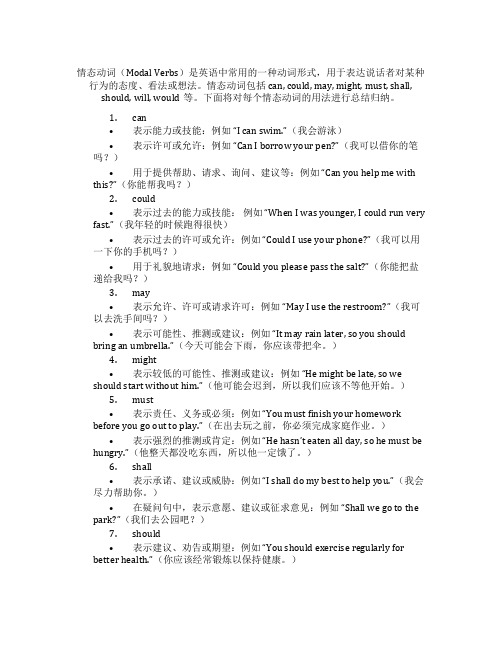
情态动词(Modal Verbs)是英语中常用的一种动词形式,用于表达说话者对某种行为的态度、看法或想法。
情态动词包括can, could, may, might, must, shall, should, will, would等。
下面将对每个情态动词的用法进行总结归纳。
1.can•表示能力或技能:例如“I can swim.”(我会游泳)•表示许可或允许:例如“Can I borrow your pen?”(我可以借你的笔吗?)•用于提供帮助、请求、询问、建议等:例如“Can you help me with this?”(你能帮我吗?)2.could•表示过去的能力或技能:例如“When I was younger, I could run very fast.”(我年轻的时候跑得很快)•表示过去的许可或允许:例如“Could I use your phone?”(我可以用一下你的手机吗?)•用于礼貌地请求:例如“Could you please pass the salt?”(你能把盐递给我吗?)3.may•表示允许、许可或请求许可:例如“May I use the restroom?”(我可以去洗手间吗?)•表示可能性、推测或建议:例如“It may rain later, so you should bring an umbrella.”(今天可能会下雨,你应该带把伞。
)4.might•表示较低的可能性、推测或建议:例如“He might be late, so we should start without him.”(他可能会迟到,所以我们应该不等他开始。
)5.must•表示责任、义务或必须:例如“You must finish your homewor k before you go out to play.”(在出去玩之前,你必须完成家庭作业。
)•表示强烈的推测或肯定:例如“He hasn’t eaten all day, so he must be hungry.”(他整天都没吃东西,所以他一定饿了。
高中英语知识点归纳情态动词和实义动词的用法讲解
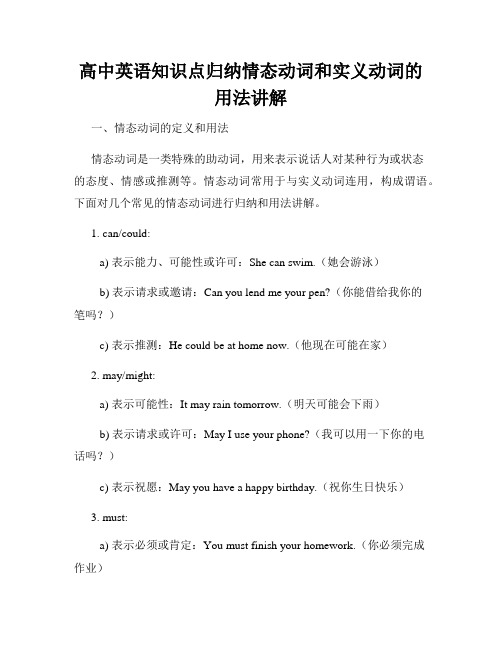
高中英语知识点归纳情态动词和实义动词的用法讲解一、情态动词的定义和用法情态动词是一类特殊的助动词,用来表示说话人对某种行为或状态的态度、情感或推测等。
情态动词常用于与实义动词连用,构成谓语。
下面对几个常见的情态动词进行归纳和用法讲解。
1. can/could:a) 表示能力、可能性或许可:She can swim.(她会游泳)b) 表示请求或邀请:Can you lend me your pen?(你能借给我你的笔吗?)c) 表示推测:He could be at home now.(他现在可能在家)2. may/might:a) 表示可能性:It may rain tomorrow.(明天可能会下雨)b) 表示请求或许可:May I use your phone?(我可以用一下你的电话吗?)c) 表示祝愿:May you have a happy birthday.(祝你生日快乐)3. must:a) 表示必须或肯定:You must finish your homework.(你必须完成作业)b) 用于反问句,表示强烈的建议或命令:Must I go now?(我现在必须离开吗?)4. shall/should:a) shall用于第一人称,表示将来的意愿、承诺、建议或命令:I shall help you with the housework.(我会帮你打扫房间)b) should用于其他人称,表示应该、建议或推测:You should exercise regularly.(你应该经常锻炼)5. will/would:a) 表示将来的意愿、决心或承诺:I will visit my grandparents this weekend.(这个周末我将去看望我的祖父母)b) would用于过去的愿望、习惯或客气的请求:He would always help others when he was young.(他年轻时总是帮助别人)二、实义动词的定义和用法实义动词是指表示实际动作或状态的动词。
(完整版)常见情态动词讲解

常有神态动词解说一、情的定:情有,但它不可以独作,它必和其余一同组成。
情没有人称和数的化;它的后边必跟原形。
二、情的种:情否认形式can能,会can’t不可以,不会could能,会couldn ’t不可以,不会may能够//must必mustn’ t不允,不可以shall将,要shan’t将不要should shouldn ’t不need需要needn’t不用would将会,愿wouldn ’t不会,不肯三、情的用法及主要句型:1、 Can I help you?——Yes, please. / No, thanks.2、 Can + 主 + 原形 ? Yes, ~ can. No, ~ can’ t.3、 Can I borrow your book?----Yes,of course.4、 Can I write on the book? ------No, you can mustn’t’ t.5、 Could \Can you help me?---- Yes,of course.\Certainly.\ Sure.6、 Could \Can you tell me the way to the Zoo?7、 May I come in ?----- Come in, please.8、Sorry, please don’ t.9、 May I have some Coke?---- Yes, of course.10、May/ Could / Can I speak to Tom? -----Speaking. Who ’ s calling?11、should 、 shouldn ’表t示告:1)He should get up early.2)She shouldn ’ t play computer game too much.12、Should +主 +原形 ? Yes, ~ should.\ No, ~ shouldn ’ t.13、表示建“你愿意⋯ ”---Yes, I’ d love to. /I’ d love to. But I’ m busy now.14、就餐用 Would you like something to eat\drink? ----Yes, I’ d like⋯15、shall 用于第一人称 (I, we), 能够表示“将”和表示建“⋯⋯好?”1)Where shall we have dinner?2)Shall we go fishing? -----All right. \OK. \Good idea.16、Must + 主 + 原形 ? ---Yes,~ must.\No, ~ needn’ t.四.常情的区:1. can (could)1)表示能力, could 主要指去。
情态动词的用法can could may

情态动词的用法can could may 情态动词是英语语法中的一个重要部分,它们能够表达说话人的态度、情感、可能性等。
在众多情态动词中,can、could 和 may 是比较常用且基础的三个,下面我们就来详细探讨一下它们的用法。
一、can 的用法1、表示能力“can”最常见的用法就是表示某人具备做某事的能力。
例如:“I can swim”(我会游泳。
)“He can play the piano”(他会弹钢琴。
)这里的“can”强调的是一种实际拥有的技能或能力。
2、表示可能性“can”也可以用来表示某事有可能发生。
比如:“It can rain tomorrow”(明天可能会下雨。
)这种情况下,“can”所表达的可能性相对较大,但不是绝对的。
3、表示许可当我们请求或给予许可时,也会用到“can”。
例如:“Can I go to the bathroom?”(我可以去洗手间吗?)“You can leave now”(你现在可以走了。
)4、表示否定的推测“can't”则用于表示否定的推测,意思是“不可能”。
例如:“He can't be at home I just saw him in the street”(他不可能在家。
我刚刚在街上看到他了。
)二、could 的用法1、 can 的过去式“could”是“can”的过去式,用于一般过去时,表示过去的能力、可能性或许可。
比如:“I could ride a bike when I was five”(我五岁的时候就能骑自行车了。
)2、表示委婉的请求或建议在现代英语中,“could”比“can”更委婉、更客气。
例如:“Could you please pass me the salt?”(您能把盐递给我吗?)“Could we meet at 8o'clock?”(我们可以八点见面吗?)3、表示可能性“could”也可以表示可能性,但比“can”的可能性要小一些。
高中英语2025届高考语法复习情态动词与虚拟语气知识讲解
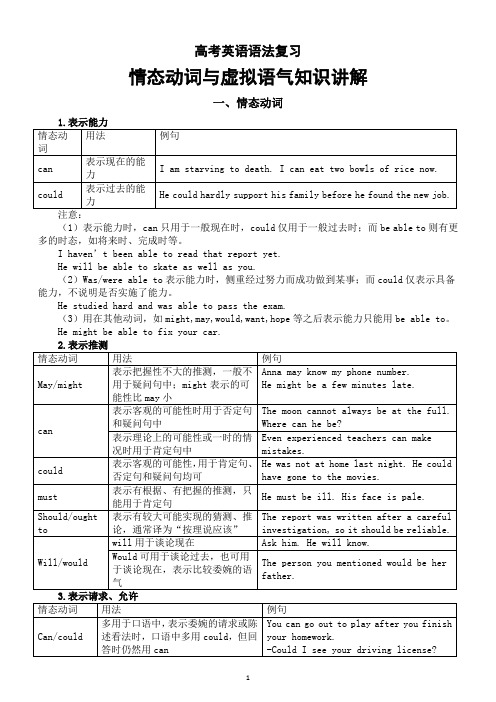
高考英语语法复习情态动词与虚拟语气知识讲解一、情态动词(1)表示能力时,can只用于一般现在时,could仅用于一般过去时;而be able to则有更多的时态,如将来时、完成时等。
I haven’t been able to read that report yet.He will be able to skate as well as you.(2)Was/were able to表示能力时,侧重经过努力而成功做到某事;而could仅表示具备能力,不说明是否实施了能力。
He studied hard and was able to pass the exam.(3)用在其他动词,如might,may,would,want,hope等之后表示能力只能用be able to。
He might be able to fix your car.(1)must还可以表示质问或感情色彩,意为“偏要,偏偏”。
Why must it snow on Saturday?(2)should还可以表示惊奇、愤怒、失望等特殊情感,尤其用在以why,who,how等开头的疑问句中或某些感叹句中。
why should you be so late today?(1)must作“必须”讲的一般疑问句,其肯定回答用must,否定回答用needn’t或don’t have to。
-Must I pay now?-Yes, you must./No, you needn’t.(2)need还可以作实义动词,有人称和数的变化,后跟带to的不定式作宾语。
She needed to go out for a walk.(1)两者在表示过去的习惯动作或行为时常可通用。
When we were children, we would/used to go skating every winter.(2)Used to与would都不能与表示具体频率、次数的词及特定的时间状语或具体的一段时间连用。
情态动词讲解分析(全)
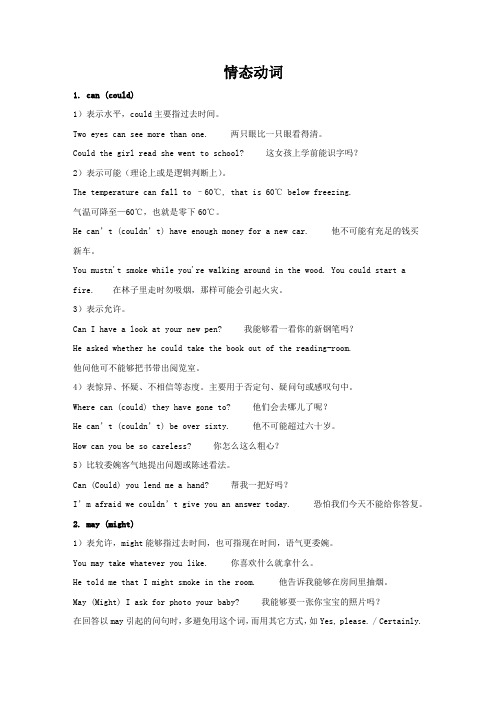
情态动词1. can (could)1)表示水平,could主要指过去时间。
Two eyes can see more than one. 两只眼比一只眼看得清。
Could the girl read she went to school? 这女孩上学前能识字吗?2)表示可能(理论上或是逻辑判断上)。
The temperature can fall to –60℃, that is 60℃ below freezing.气温可降至—60℃,也就是零下60℃。
He can’t (couldn’t) have enough money for a new car. 他不可能有充足的钱买新车。
You mustn't smoke while you're walking around in the wood. You could start a fire. 在林子里走时勿吸烟,那样可能会引起火灾。
3)表示允许。
Can I have a look at your new pen? 我能够看一看你的新钢笔吗?He asked whether he could take the book out of the reading-room.他问他可不能够把书带出阅览室。
4)表惊异、怀疑、不相信等态度。
主要用于否定句、疑问句或感叹句中。
Where can (could) they have gone to? 他们会去哪儿了呢?He can’t (couldn’t) be over sixty. 他不可能超过六十岁。
How can you be so careless? 你怎么这么粗心?5)比较委婉客气地提出问题或陈述看法。
Can (Could) you lend me a hand? 帮我一把好吗?I’m afraid we couldn’t give you an answer today. 恐怕我们今天不能给你答复。
高考英语情态动词讲解及习题(附答案)
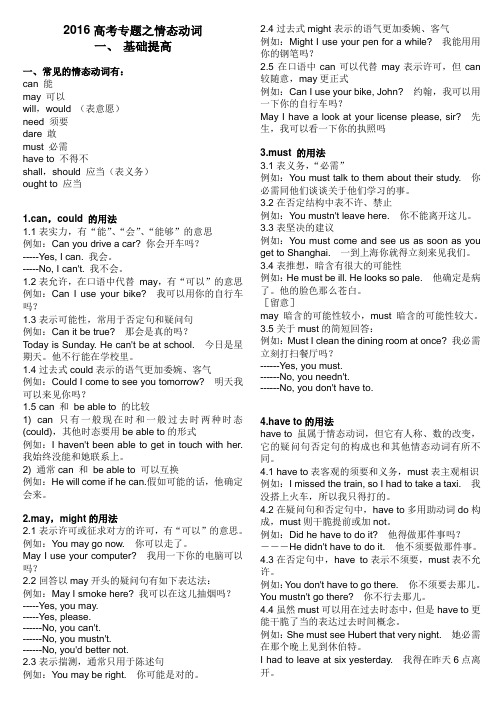
2016高考专题之情态动词一、基础提高一、常见的情态动词有:can 能may 可以will,would (表意愿)need 须要dare 敢must 必需have to 不得不shall,should 应当(表义务)ought to 应当1.can,could 的用法1.1表实力,有“能”、“会”、“能够”的意思例如:Can you drive a car? 你会开车吗?-----Yes, I can. 我会。
-----No, I can't. 我不会。
1.2表允许,在口语中代替may,有“可以”的意思例如:Can I use your bike?我可以用你的自行车吗?1.3表示可能性,常用于否定句和疑问句例如:Can it be true?那会是真的吗?Today is Sunday. He can't be at school.今日是星期天。
他不行能在学校里。
1.4过去式could表示的语气更加委婉、客气例如:Could I come to see you tomorrow?明天我可以来见你吗?1.5 can 和be able to 的比较1) can 只有一般现在时和一般过去时两种时态(could),其他时态要用be able to的形式例如:I haven't been able to get in touch with her.我始终没能和她联系上。
2) 通常can 和be able to 可以互换例如:He will come if he can.假如可能的话,他确定会来。
2.may,might的用法2.1表示许可或征求对方的许可,有“可以”的意思。
例如:You may go now.你可以走了。
May I use your computer?我用一下你的电脑可以吗?2.2回答以may开头的疑问句有如下表达法:例如:May I smoke here? 我可以在这儿抽烟吗?-----Yes, you may.-----Yes, please.------No, you can't.------No, you mustn't.------No, you'd better not.2.3表示揣测,通常只用于陈述句例如:You may be right.你可能是对的。
日常生活情态动词用法总结
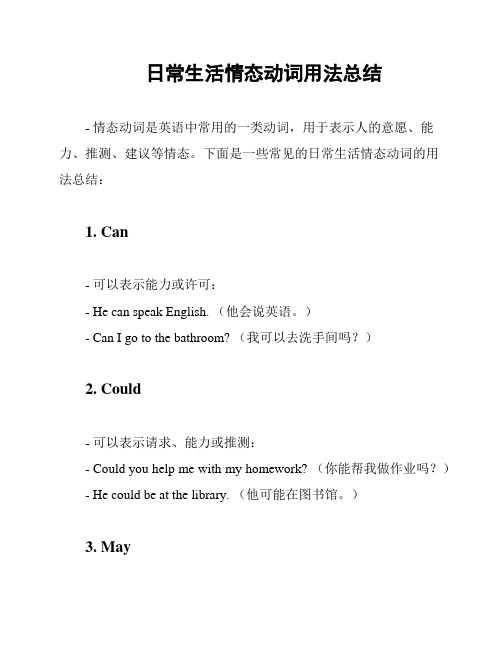
日常生活情态动词用法总结- 情态动词是英语中常用的一类动词,用于表示人的意愿、能力、推测、建议等情态。
下面是一些常见的日常生活情态动词的用法总结:1. Can- 可以表示能力或许可:- He can speak English. (他会说英语。
)- Can I go to the bathroom? (我可以去洗手间吗?)2. Could- 可以表示请求、能力或推测:- Could you help me with my homework? (你能帮我做作业吗?)- He could be at the library. (他可能在图书馆。
)3. May- 可以表示许可或推测:- May I borrow your pen? (我可以借用你的钢笔吗?)- He may arrive late. (他可能会迟到。
)4. Might- 可以表示或许的推测或请求许可:- I might go to the party tonight. (我今晚可能会去派对。
)5. Must- 可以表示必须或推测:- You must study for the exam. (你必须为考试研究。
)- It must be cold outside. (外面一定很冷。
)6. Should- 可以表示建议或期望:- You should eat more vegetables. (你应该多吃蔬菜。
)- He should be here by now. (他现在应该在这里。
)7. Ought to- 可以表示应该或期望:- You ought to listen to your parents. (你应该听父母的话。
)- He ought to be more careful. (他应该更加小心。
)8. Would- 可以表示客气的请求、愿望或假设:- Would you like some tea? (你想喝点茶吗?)- I would like to travel to Japan. (我想去日本旅行。
- 1、下载文档前请自行甄别文档内容的完整性,平台不提供额外的编辑、内容补充、找答案等附加服务。
- 2、"仅部分预览"的文档,不可在线预览部分如存在完整性等问题,可反馈申请退款(可完整预览的文档不适用该条件!)。
- 3、如文档侵犯您的权益,请联系客服反馈,我们会尽快为您处理(人工客服工作时间:9:00-18:30)。
常见情态动词讲解一、情态动词的定义:情态动词有词义,但它不能单独作谓语,它必须和其他动词一起构成谓语。
情态动词没有人称和数的变化;它的后面必须跟动词原形。
二、情态动词的种类:三、情态动词的用法及主要句型:1、Can I help you? ——Yes, please. / No, thanks.2、Can + 主语+ 动词原形? Yes, ~can. No, ~can’t.3、Can I borrow your book?----Yes,of course.4、Can I write on the book? ------No, you can’t\mustn’t.5、Could \Can you help me?---- Yes,of course.\Certainly.\ Sure.6、Could \Can you tell me the way to the Zoo?7、May I come in ?----- Come in, please.8、May I sit here?----- Yes, please.\Sorry, please don’t.9、May I have some Coke?---- Yes, of course.10、May/ Could / Can I speak to Tom? -----Speaking. Who’s calling?11、should 、shouldn’t 表示劝告:1) He should get up early.2) She shouldn’t play computer game too much.12、Should +主语+动词原形? Yes, ~should.\ No, ~shouldn’t.13、表示建议“你愿意…吗”---Would you like to go shopping with me?---Yes, I’d love to. /I’d love to. But I’m busy now.14、就餐用语Would you like something to eat\drink? ----Yes, I’d like…15、shall用于第一人称(I, we), 可以表示“将”和表示建议“……好吗?”1) Where shall we have dinner?2) Shall we go fishing? -----All right. \OK. \Good idea.16、Must + 主语+ 动词原形? ---Yes,~must.\No, ~needn’t.四.常见情态动词的区别:1. can (could)1)表示能力,could主要指过去时间。
Two eyes can see more than one. 两只眼比一只眼看得清。
Could the girl read before she went to school? 这女孩上学前能识字吗?2)表示可能(理论上或是逻辑判断上)。
He can´t (couldn´t) have enough money for a new car. 他不可能有足够的钱买新车。
3)表示允许。
Can I have a look at your new pen? 我可以看一看你的新钢笔吗?4)表惊异、怀疑、不相信等态度。
主要用于否定句、疑问句或感叹句中。
Where can (could) they have gone to? 他们会去哪儿了呢?He can´t (couldn´t) be over sixty. 他不可能超过六十岁。
How can you be so careless! 你怎么这么粗心!5)比较委婉客气地提出问题或陈述看法。
Can (Could) you lend me a hand? 帮我一把好吗?2.may (might)1)表允许,might可以指过去时间,也可指现在时间,语气更委婉。
You may take whatever you like. 你喜欢什么就拿什么。
He told me that I might smoke in the room. 他告诉我可以在房间里抽烟。
May (Might) I ask for a photo of your baby? 我可以要一张你宝宝的照片吗?在回答以may引起的问句时,多避免用这个词,而用其它方式,如Yes, please. / Certainly. / Please don´t ./ You´d better not. / No, you mustn´t.等,以免显得太严峻或不客气。
2)表可能(事实上)。
可以指过去时间,也可以指现在时间,但语气更加不肯定。
He may be at home. 他可能在家。
She may not know about it. 她可能不知道这件事。
They might be having a meeting, but I´m not sure. 他们有可能在开会,不过我不肯定。
3.must1)表示义务。
意为“必须”(主观意志)。
We must do everything step by step. 我们一切都必须循序渐进地做。
You mustn´t talk to her like that. 你不可能那样对她说话。
--Must we hand in our exercise—books now? 我们现在就要交练习本吗?--No, you needn´t. / No, you don´t have to. 不必。
(这种情况下,一般不用mustn´t)2)表示揣测。
意为“想必、准是、一定”等,只用于肯定句。
He must be ill. He looks so pale. 他准是病了。
他的脸色苍白。
4.shall1)表征询意见,用于第一、第三人称疑问句。
Shall I get you some tea? 我给你点茶好吗?Shall the boy wait outside? 让那男孩在外面等吗?What shall we do this evening? 我们今晚做什么?2)表说话人的意愿,有“命令、允诺、警告、决心”等意思,用于第二、第三人称陈述句。
You shall do as I say. 按我说的做。
(命令)You shall have my answer tomorrow. 你明天可以得到我的答复。
(允诺)He shall be sorry for it one day, I tell you. 有一天他会后悔的,我告诉你。
(警告)Nothing shall stop us from carrying out the plan. 什么也不能阻止我们执行这项计划。
(决心)5.will1)表意愿,用于各种人称陈述句。
I will do anything for you. 我愿为你做任何事。
2)表请求,用于疑问句。
Will you close the window? It´s a bit cold. 请你把窗户关上好吗?有点冷。
3)表示某种倾向或习惯性动作。
Fish will die out of water. 鱼离开水就不能活。
6.should1)表义务。
意为“应该”(某件事宜于做),用于各种人称。
You shouldn´t waste any time. 你不应该浪费时间。
2)表推测,意为“想必一定、照说应该、估计”等。
They should be home by now. 照说他们现在应当已经到家了。
7.would1)表意愿。
I said I would do anything for you. 我说过我愿意为你做任何事。
2)表委婉地提出请求、建议或看法。
Would you like another glass of beer? 再来杯啤酒好吗?3)表过去反复发生的动作或过去的一种倾向。
Every time she was in trouble, she would go to him for help. 她每遇到麻烦都会向她求助。
他告诉我盒子打不开了。
相关练习(一) 用适当的情态动词填空。
1. Must I borrow the book with my ID card? No, you ________.2. ________ I use your car? Yes, you ________.3. ________ I go home now? No, you _________ stay here.4. My mother is ill. I _________ stay at home and look after her.5. ________ you like some tea?6. You ________ take more exercise.7. ________ you tell me how to get to the Qingyun Park?8. The clock ________ tell us the time.9. ________ you like to go fishing with me?10. ________ we play football this afternoon?(二) 按要求改写句子。
1. I can run fast.I ________ ________ fast. (否定句)2. You must return the book now.(一般疑问句)________ I the book now? No, you ________.3. He can play basketball well. (一般疑问句)_______ he ______ basketball well?4. They must take the books out of the room. (否定句)They ________ ________ the books out of the room.5. He should get up early. (否定句)He _______ get up late.(三) 单项选择。
( ) 1. you like some milk ? A . Would B. Could C . Can ( ) 2. We pick the flower in the park. A. can’t B. don't C. mustn’t ( ) 3. We should more trees, and we shouldn’t cut any trees.A. plantB. plantingC. plants( ) 4. May I have some coffee?A. Yes,you have.B. Yes,you can.C. Yes,certainly.( ) 5. Shall we visit the factory?A. Yes,we do.B. Yes, we shall.C. All right.( ) 6. Would you like something to eat?A. Yes,we would.B. Yes, I’d like some cakes.C. Yes, of course.( ) 7. What can I do for you?A. Yes,you can.B. No,I can do it.C. Yes.I’d like some orange s.(四) 根据所学情态动词,填写适当形式。
